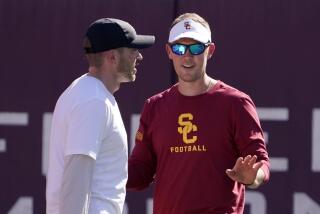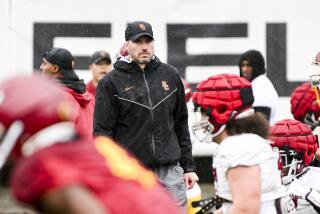Accountability works
- Share via
This has been Southern California’s summer of secrecy. The “leaders” — and we use that term advisedly — of Bell showed that by concealing their actions from the public, they could put together some fat paychecks. The representatives of United Teachers Los Angeles balked when The Times published data daring to suggest that teachers be held accountable for the performance of their students. A judge tried to control her courtroom by restraining the news media — in violation of rudimentary constitutional law. The union representing sheriff’s deputies fought to keep the names of officers involved in shootings private. The “guardians” of county government learned of children’s deaths in the foster care system — and responded by launching an investigation into the leaks of those shocking failures.
It is complicated to live in an open society. To many in government, the public is an irritant, a demanding presence that interferes with good-faith efforts to improve the world. And yes, accountability can strike those on its receiving end as unfair: It’s no fun for the teacher whose students fail year after year to read about it in the Sunday paper; it’s frightening for the police officer who has shot someone to have that fact known to anyone who watches the evening news.
But does that justify the alternative? Do teachers whose students consistently come up short on standardized tests deserve the right to hide that from parents? Are we better off if police officers regard themselves as immune from public scrutiny?
This has been the talk, in these suddenly warm weeks, of backyard barbecues and picnic table debates. Some side with public servants who do their best and feel persecuted. Some vilify public employees and imagine that they are soaking up taxpayer dollars without having to answer for their performance.
Framed as a violation of the privacy of teachers or city council members or criminal defendants or social workers or police, the question might suggest that secrecy is warranted. But what if the question is asked by those who depend on the government’s work? The residents of Bell have paid dearly for a city government that hid its actions; the parent who wants the best for her child is hindered by the school district that refuses to tell her how teachers measure up.
These are not abstractions. They are not about the 1st Amendment clashing with the right of privacy, or about other conflicts between constitutional rights. They are real-life examples of what happens when society forgets its most fundamental duties. Secrecy deflects accountability. It allows judges to err, children to die. Information is its antidote.
Here’s to an autumn of accountability.
More to Read
Sign up for Essential California
The most important California stories and recommendations in your inbox every morning.
You may occasionally receive promotional content from the Los Angeles Times.













